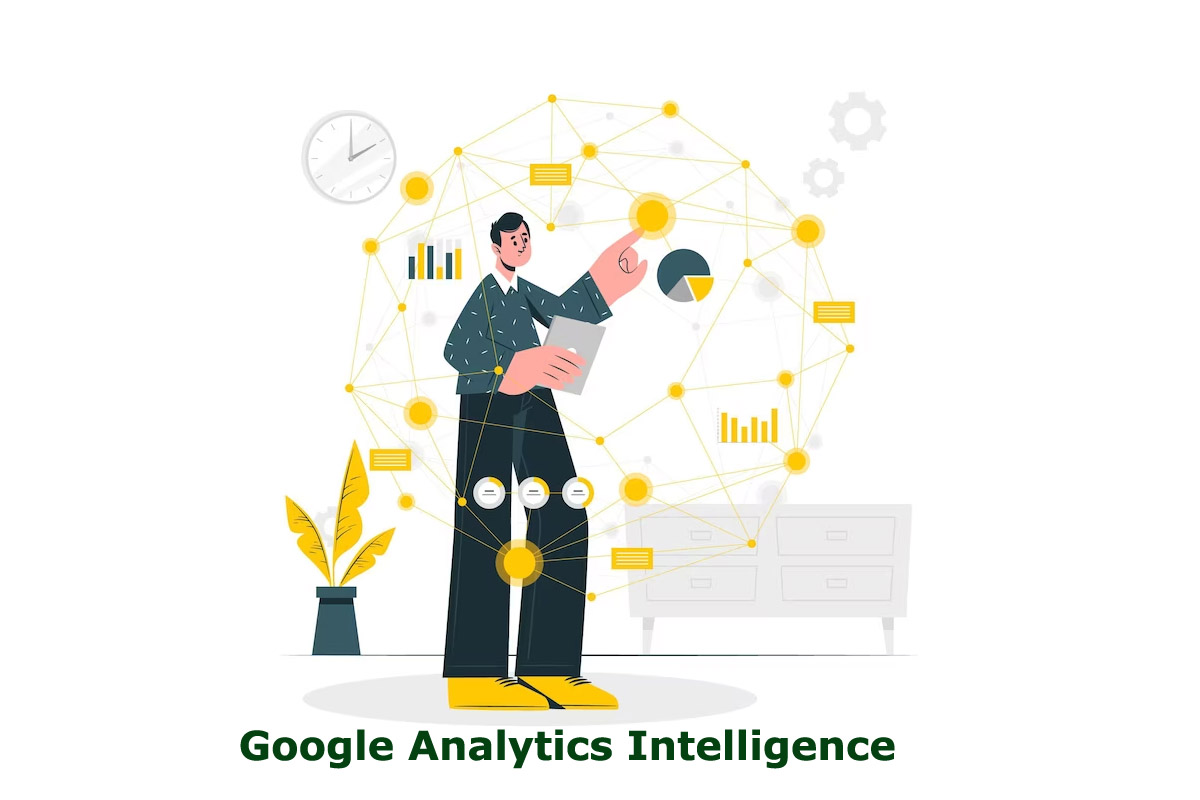Google Analytics Intelligence
Google Analytics Intelligence can help you to make your collected data easy for your website’s visitors, allowing you to understand user behavior, track performance, and make data-driven decisions. Google Analytics Intelligence is a valuable feature within the Google Analytics platform that harnesses the power of artificial intelligence and machine learning to provide automatic insights and analysis of website and app data.
It offers many benefits, such as saving time through automated reporting, allowing data-driven decision-making, and facilitating irregularity detection and predictive analytics. To maximize the benefits of Google Analytics Intelligence, users should remain aware of its proficiencies and limitations and stay up-to-date with any changes or updates.
How is Google Analytics Intelligence?
Google Analytics Intelligence works based on artificial intelligence and machine learning so that you can analyze vast amounts of data. Now this process is divided into various steps:
- Collection of the Data: The first thing you need to do is collect the data from multiple sources like users’ behavior, number of visitors, traffic sources, people’s interaction with your website, and more. The data is collected by using JavaScript code that will be placed on your web page. Once the data is collected, we can move to the next step.
- Processing of Data: Once you collect the data, it is analyzed in the Google Analytics server. The data is anonymized and aggregated to protect user privacy while providing valuable insights.
- Machine Learning Algorithm: Google will use advanced machine learning algorithms to analyze the gathered data and identify patterns and trends. These algorithms are designed to learn about the data and enhance accuracy over time.
- Automated Insights: Automated Insights: The machine learning algorithms generate automated insights by identifying significant changes in your website’s data. For example, it might detect sudden spikes in traffic, changes in user engagement, popular pages, or demographic trends.
- Anomaly Detection: Google Analytics Intelligence employs anomaly detection algorithms to identify unusual fluctuations in your data. This helps you quickly spot unexpected changes that may require further investigation.
- Natural Language Processing (NLP): Google Analytics Intelligence utilizes natural language processing to allow users to interact with the data using plain language queries. This feature makes it easier for users to ask questions and receive appropriate insights without the need for complex queries or technical expertise.
- Custom Alerts: Users can set up custom alerts to receive notifications when particular metrics reach predefined verges. This helps them stay informed about crucial changes in their website’s performance.
What are the Pros and Cons of Google Analytics Intelligence?
Pros
One of the significant advantages of Google Analytics Intelligence is its ability to provide automated insights. It saves time and effort by automatically identifying significant trends and changes in your data, which would otherwise require manual analysis.
By providing data-driven insights, Google Analytics Intelligence empowers users to make informed decisions based on real-time data. This helps improve marketing strategies, user experiences, and overall website performance.
The AI-powered system can quickly detect unusual fluctuations in your data, such as sudden spikes or drops in traffic. This enables users to address potential issues or capitalize on unexpected opportunities promptly.
With predictive analytics, users can anticipate future trends and user behavior based on historical data. This helps plan marketing campaigns, content strategies, and other business initiatives.
Google Analytics Intelligence provides a comprehensive view of your website’s performance, allowing you to monitor key metrics and identify areas for improvement.The intelligence feature provides valuable insights into user demographics, behavior, and interests. This information helps understand the target audience better and tailor marketing efforts accordingly.
Google Analytics offers interactive and visually appealing data visualizations, making interpreting and communicating insights to stakeholders easier.
Cons
While the automated insights provided by Google Analytics Intelligence can be helpful, they may not always align perfectly with your business goals and needs. Users may have specific limitations in customizing the generated insights to suit their requirements.
The accuracy of the insights generated by Google Analytics Intelligence relies on the quality of the collected data. If there are data collection or data integrity issues, it can impact the accuracy of the automated insights.
The predictive analytics feature depends on historical data to make future predictions. If your website or app has a limited data history, the predictive capabilities may not be as robust or accurate.
While AI and machine learning are powerful tools, they are not infallible. There might be instances where the algorithms make incorrect interpretations or fail to identify subtle patterns.
Despite efforts to simplify the interface with natural language processing, Google Analytics can still be overwhelming for beginners or users with limited experience in data analysis.
Google Analytics collects user data to generate insights. This data collection can raise privacy concerns, and website owners must ensure compliance with relevant privacy regulations and have clear privacy policies in place.
While Google Analytics provides valuable data, it may not always offer real-time insights. There could be a delay in data processing and reporting, especially for high-traffic websites.
Conclusion
While Google Analytics Intelligence can be a powerful tool for data analysis and decision-making, it’s essential to recognize its limitations and potential challenges. Users should critically approach the platform’s insights and supplement them with other data analysis methods when necessary. Additionally, staying up-to-date with the latest changes and developments in Google Analytics can help users make the most of its features while being aware of any changes that might impact their data analysis process.

